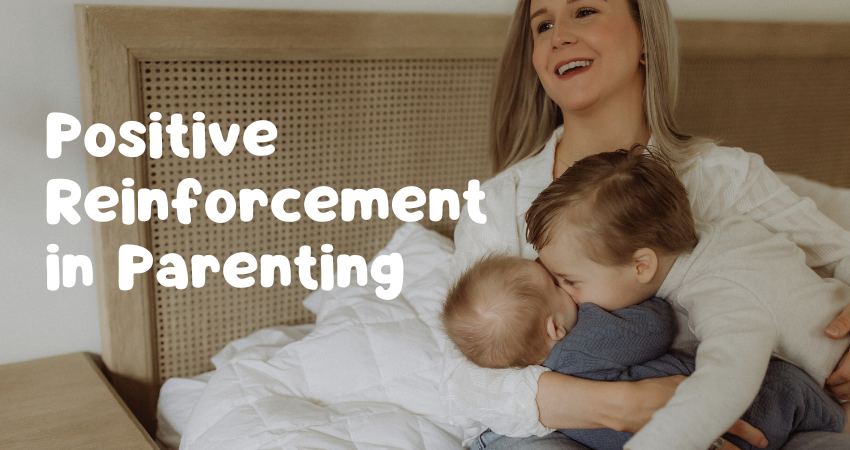The Power of Praise: Using Positive Reinforcement in Parenting
Let’s explore the science behind the power of praise and offer practical tips for incorporating positive reinforcement into your parenting approach.

Parenting is a journey that presents unique challenges and rewards. As parents, we want to raise confident, well-adjusted, and successful children. One effective thing for achieving this goal is the power of praise and positive reinforcement. Praising children for their efforts and achievements can have a profound impact on their self-esteem, motivation, and overall development.
Let’s explore the science behind the power of praise and offer practical tips for incorporating positive reinforcement into your parenting approach.
The Science Behind Praise
Parenting is more than just providing for a child’s basic needs. It involves shaping their character, instilling values, and nurturing their emotional and psychological well-being. One of the most effective tools at a parent’s disposal is praise.
Positive reinforcement, including praise, is based on behavioral psychology principles. It centers on the concept that behaviors that are followed by positive consequences are more likely to be repeated. When you praise your child for a particular behavior, they are more inclined to engage in that behavior again to experience positive reinforcement.
Neurologically, praise activates the reward centers in the brain, releasing neurotransmitters such as dopamine, which creates feelings of pleasure and motivation. This not only reinforces the specific behavior but also builds a stronger parent and child bond, fostering a positive and loving relationship.
Understanding the Art of Praise
Praise isn’t simply showering children with compliments; it’s an art that requires thoughtfulness and intention. Meaningful praise focuses on effort, improvement, and specific achievements rather than offering empty flattery.
The Impact of Positive Reinforcement
Positive reinforcement, such as praise, has been proven to enhance learning and behavior. When children are acknowledged for their actions, they are more likely to repeat those actions in the future.
The Dos and Don’ts of Effective Praise
Be Specific
General praise like “Good job” is nice, but it lacks specificity. When praising your child, be specific about what behavior you’re praising. For example, “Great job sharing your toys with your sibling” or “I’m proud of how you worked hard to complete your homework” is more effective in reinforcing the desired behavior.
Be Genuine
Children have a keen sense of sincerity. Make sure your praise is genuine and heartfelt. Insincere or excessive praise might backfire and lessen its impact over time.
Encourage Effort, Not Just Outcomes
While it’s tempting to focus on the end result, praising the effort your child puts into a task, regardless of the outcome, encourages them to keep trying and not fear failure.
Avoid Empty Praise
Empty praise lacks substance and can diminish the value of genuine praise. Instead of praising everything, focus on moments that truly deserve recognition.
Praise Progress and Improvement
Celebrate the progress your child makes, even if it’s small or big like laughing or crawling. Acknowledging improvement over time motivates children to continue growing and learning.
Balancing Effort and Accomplishment
While acknowledging accomplishments is important, praising the effort put into those accomplishments can be equally beneficial. It encourages a strong work ethic, habits and a willingness to try new things.
Benefits of Positive Reinforcement
Boosts Self-Esteem
Regular praise helps children develop a positive self-image and greater self-confidence. It shows them that their efforts and accomplishments are valued and appreciated.
Enhances Motivation
Children who receive praise for their efforts, such as when a toddler is not ready for a bed and as a parent you understand it and help your child to transit easily. They feel more motivated to take on challenges and persist in the face of difficulties. They develop a growth mindset, believing that their abilities can be developed through dedication and hard work. This mindset fosters a sense of resilience and a willingness to embrace new experiences.
Strengthens Parent-Child Bond
Positive reinforcement fosters a warm and loving relationship between parent and child. Children feel secure, valued, and understood, which improves communication and cooperation.
Encourages Positive Behavior
When children experience the positive outcomes of their actions through praise, they are more likely to engage in desirable behaviors and make better choices.
FAQs
1. How often should I praise my child?
Praise should be genuine and focused on effort, not excessive. A few sincere praises a day can be more impactful than constant flattery.
2. Can overpraising be harmful?
Yes, overpraising can lead to children seeking constant validation and feeling pressure to be perfect, which can hinder their growth.
3. What if my child doesn’t respond positively to praise?
Every child is different. If your child seems uncomfortable with praise, focus on their comfort zone and adapt your approach over time.
4. Is criticism necessary alongside praise?
Yes, constructive feedback helps children understand areas for improvement. Combining praise with gentle guidance fosters holistic growth.
5. How can I praise my child’s efforts without creating entitlement?
Emphasize the value of hard work and perseverance. Connect praise to the process of trying and learning rather than solely to outcomes.
Conclusion
The power of praise and positive reinforcement in parenting cannot be underestimated. By incorporating genuine and specific praise into your daily interactions with your child, you can nurture their self-esteem, motivate them to grow, and strengthen your parent-child bond. Remember, effective praise focuses on effort, improvement, and specific behaviors, creating a supportive and loving environment that promotes the well-being and success of your child.



